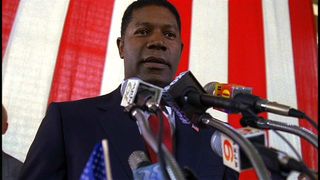 Young, bright-eyed, handsome and charismatic to the core; an optimist and a visionary with a profound ability to evoke a deeply rooted, and perhaps dormant, sense of populism in the hearts and minds of Americans. Yes, it has hardly gone unnoticed that presidential hopeful Barack Obama shares more than just a few characteristics, particularly when it comes to public image, with former president John F. Kennedy. But more importantly, he shares these characteristics with his true predecessor, the former president who makes Obama’s run legitimate and his candidacy strong: David Palmer.
Young, bright-eyed, handsome and charismatic to the core; an optimist and a visionary with a profound ability to evoke a deeply rooted, and perhaps dormant, sense of populism in the hearts and minds of Americans. Yes, it has hardly gone unnoticed that presidential hopeful Barack Obama shares more than just a few characteristics, particularly when it comes to public image, with former president John F. Kennedy. But more importantly, he shares these characteristics with his true predecessor, the former president who makes Obama’s run legitimate and his candidacy strong: David Palmer.
“24”’s hero, counter-terrorism unit agent Jack Bauer, breathlessly and brilliantly portrayed by the complex and outspokenly liberal Kiefer Sutherland, often uses torture (or “enhanced interrogation techniques”) to extract vital information from a captured terrorist in just enough time to save Los Angeles from being blown to kingdom come, which is a perfectly reasonable thing to do in a fictional fantasy world. But military experts, like John McCain, a victim of torture himself, almost invariably agree that the “ticking time bomb scenario” is baseless and that torture is completely ineffective when it comes to extracting useful, or even real, information.
And so “24” became a focal point for both anti-torture activists and waterboarding cheerleaders in and around the Bush administration. Absurdly, Sutherland himself was encouraged to spell out the differences between fantasy and reality to impressionable young service men and women who might be thinking of emulating Agent Bauer and who – call me crazy — really should have been given this information by their military higher-ups and not by a hard-partying television star.
Since its debut in 2001 and throughout its thus-far six seasons, “24” has averaged about 12 million viewers per week. If one factors in the record-breaking sales of the season box sets on DVD, the sheer number of Americans that “24” reaches is both enormous and utterly impossible to precisely gauge. Needless to say, it’s a lot.
If “24” is able to inadvertently place itself at the center of a real political debate, if it is so clearly entrenched and influential in American culture, then how could one not assume that between 2002 and 2004 (the span of David Palmer’s television presidency), millions of Americans were unconsciously both warming to the idea and cementing the specific image of a black man in the White House? Who could possibly refute, outright, the idea that America is ready for an African-American president largely (if not entirely) because of the example of President David Palmer, portrayed by the great Dennis Haysbert?
1. Palmer came to the presidency between the first and second seasons of “24,” which is to say he was elected in president in 2002. Haysbert was born in 1954, and, assuming he and Palmer are the same age, Palmer became President at age 48. If elected, Obama, born in 1961, would take office in January of 2009, at the age of 47.
2. Both Obama and Palmer have been labeled popular long-shots. Palmer was elected, and Obama’s landslide win in Iowa last week has, quite unbelievably, catapulted him ahead of Hillary Clinton in New Hampshire’s polls going into this week’s primary.
3. Both are notable for their articulate, disarming speaking styles and warm baritone voices.
4. Both came to the presidential race after serving successfully as popular senators (Obama representing Illinois, Palmer representing Maryland)
5. Both ascended to political prominence in the wake of scandals (Obama’s Republican opponent, Jack Ryan, withdrew over revelations of immoral behavior resulting from his divorce from “Star Trek: Voyager” star Jeri Ryan; Palmer after having quashed, with Jack Bauer’s help, an effort to frame his son for murder.)
6. As mentioned, both model themselves at least in part on the charisma, idealism, and populism of J.F.K.
But what matters, specifically, about President Palmer is that, in quite legitimate ways, he was America’s first black president. At the very least, he deserves this mantle over Bill Clinton who is often referred to, in jest but for significant reasons, as America’s “first black president”.
A year ago, former-and-perpetually hopeless presidential hopeful Joe Biden said this about Obama: “I mean, you got the first mainstream African-American who is articulate and bright and clean and a nice-looking guy. I mean, that’s a storybook, man.” Biden is notoriously good at sticking his foot in his mouth, and this comment sparked a minor and perhaps slightly over-the-top discussion about the use of the word “articulate” as a kind of latent racial epithet that white America uses to describe prominent black figures, like Denzel Washington, Sidney Poitier, or Obama himself, who they supposedly feel are more readily “acceptable”, or, perhaps more importantly, marketable to whites. It’s an interesting point, to be sure, and I am certain not without merit.
Within twelve hours of his remark going public, Biden was sitting next to Jon Stewart on “The Daily Show,” groveling, apologizing, and clarifying. And it was not that Jesse Jackson is somehow “unclean”. It was that not Jesse Jackson, not Al Sharpton, and certainly not Alan Keyes, all three members of a political era that Obama is systematically and intentionally attempting to put to rest, have been able to define and cement the framework for what a black president would and should be. Nobody had. Nobody except David Palmer, that is.
Perhaps one of the things we overlook when we talk about the criteria for a black president is that there are criteria for a president, period. Andrew Jackson established a permanent tradition of the “common man”, which is to say that the president should be intelligent and knowledgeable when it comes to foreign and domestic affairs but outwardly convey some aura of a guy who goes to the bar after work. And in reality, the latter has proven to matter more to the electorate than the former, as, for example, Richard Nixon, who had the former in spades but when it came to the latter was shockingly, comically, and tragically out of touch. The opposite can and has been said about the current Commander in Chief, despite his sobriety.
The mistake made on both sides of the racial divide is that somehow a black president would have to be sort of black-in-name-only. Some have gone so far as to call Obama an “African African-American”, suggesting that in order to count as “African-American”, one must trace one’s American roots to the slave trade and Obama’s lineage bypasses this (presumably, David Palmer, with a last name clearly rooted in the white Christian-European tradition, would have descended from slaves). These arguments can reach and have reached the point of absurdity and meaninglessness.
The reality is that Obama is appealing to whites, blacks, the poor, the rich, the middle-class, liberals, conservatives, Democrats, and Republicans, and there is a crucial reason for this that transcends race and even politics: like David Palmer before him, Obama has nailed that “common man” thing. That is to say, rather, like David Palmer before him and categorically not like Jesse Jackson before him. If there’s one thing that really matters about Obama and Palmer it’s that, no matter what your background, it is very easy to image yourself getting along with both of them, having a beer with either of them, relating to them, black or white, poor or rich, and yet you would still rest assured that they know more about politics than you ever will, that they make a more competent president that you ever could.
It is extraordinary that, at this point in a firmly established presidential race, the matter of Obama’s race is seldom if ever addressed, short of the obvious mention of the fact that he would be the first black president in American history. And this morning, as I stood in line at the bagel place watching Obama on New York One and hearing the remarkable news that he had pulled ahead of Clinton in New Hampshire, it sort of dawned on me that this guy, Obama, is actually going to win. I believe that now. Obama is going to be our next president. And nothing about that really surprises me.
But in truth, I think without Palmer preceding him, and without such a pre-existing model, Obama’s run would have been a long shot at best. I know in my own mind that I liked the idea of President Palmer. Haysbert and the writers of “24” put together a character so compelling, so affable, and so richly layered that they managed to do what many may have thought impossible: make the fact of his race irrelevant. And I am willing to suggest, and I think justified in suggesting, that I am not alone here; that, in fact, “24” legitimately not only opened the door to the first black president, but slyly and quietly reshaped the American political landscape in such a way that no one would think it a foreign or unlikely scenario that someone like Obama could easily and win both a Democratic primary and feasibly the White House.
Obama has never actually addressed this –shockingly, no one has actually asked- but I am willing to bet he thinks so, too. If I could get together with him for a cold beer at a bar after work, I would be sure to ask.
— Written by John Brooks


